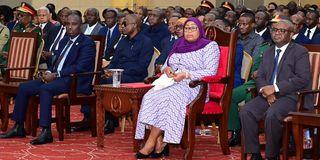Prime
Tanzania government receives record Sh1.03 trillion in dividends, contributions from public entities

What you need to know:
- The handover, which took place on Tuesday, June 10, 2025, marks the highest collection since the establishment of the Office of the Treasury Registrar (OTR) in 1959
Dar es Salaam. The government has received a record Sh1.028 trillion in dividends and contributions from public institutions and companies in which it holds minority shares.
The handover, which took place on Tuesday, June 10, 2025, marks the highest collection since the establishment of the Office of the Treasury Registrar (OTR) in 1959, according to the Treasury Registrar, Mr Nehemia Mchechu.
The amount represents a 68 percent increase compared to the same period last year and accounts for 34 percent of total collections for the 2023/24 financial year, he said.
During the same period last year, the government received Sh611 billion, which increased to Sh767 billion by the end of the 2023/24 fiscal year. This year’s total is expected to rise further as collections continue until June 30, 2025.
President Samia Suluhu Hassan who received the dividends, attributed the achievement to improved efficiency and productivity across public institutions, following her directives aimed at reforming operations and boosting performance.
Speaking during the handover event, Treasury Registrar Nehemiah Mchechu said the contributions came from 213 entities—195 public institutions and 18 companies in which the government holds minority shares.
However, 57 institutions, equivalent to 22 percent, had yet to submit their dividends, he said.
“We will continue to strengthen oversight to ensure public institutions make meaningful contributions to the country’s socio-economic development,” said Mr Mchechu.
Of the Sh1.028 trillion collected, 59 percent came from profit-making entities in the form of dividends.
Another 35 percent was generated from contributions based on 15 percent of gross revenue, while the remaining six percent came from sources including loan repayments, interest from on-lent funds, and fees from the advanced Telecommunications Traffic Monitoring System (TTMS).
Mr Mchechu noted that while the overall performance has improved, challenges persist—particularly in reducing reliance on government subsidies and turning around loss-making institutions.
He emphasised the Treasury’s ongoing commitment to President Hassan’s 4Rs philosophy, with particular focus on reforms and rebuilding.
Performance recognition
Planning and Investment minister, Prof Kitila Mkumbo, pledged that his ministry, through the OTR, would continue to implement robust strategies aimed at strengthening oversight and performance evaluation across public institutions.
“As we head into the 2025/26 financial year, we will work to ensure the President’s directives are implemented not just in word but through clear policy actions and measurable outcomes,” he said.
The recognition event highlighted the top-performing institutions contributing to the government’s revenue during the 2024/25 financial year.
Among the leading contributors of dividends was Twiga Minerals Corporation, which paid Sh93.6 billion. It was followed by Airtel Tanzania with Sh73.9 billion and NMB Bank Plc with Sh68.2 billion—underscoring the profitability and fiscal discipline of key private-public entities.
Institutions contributing based on 15 percent of gross revenue were also recognised, with the Tanzania Ports Authority (TPA) emerging as the top performer, having submitted Sh181.1 billion. The National Identification Authority (NIDA) followed with Sh38.8 billion, while the Tanzania Forest Services Agency (TFS) contributed Sh29.8 billion.
Entities that recorded the highest year-on-year growth in their contributions were equally commended.
The Tanzania Petroleum Development Corporation (TPDC) reported a 100 percent increase, the National Housing Corporation (NHC) registered a 363 percent rise, while the Tanzania Agricultural Development Bank (TADB) posted a 285 percent growth—figures attributed to more effective operational strategies and improved business models.
Public bodies that have maintained consistent contributions over five consecutive years were also celebrated.
These included the Tanzania Communications Regulatory Authority (TCRA), the Tanzania Shipping Agencies Corporation (TASAC), and the Business Registrations and Licensing Agency (BRELA), all recognised for their sustained financial discipline and institutional resilience.
Special recognition was given to institutions that successfully transitioned from persistent losses to profitability. A notable example was the Tanzania-Zambia Crude Oil Pipeline (Tazama), which moved from over a decade of losses to posting a Sh6.6 billion dividend—a remarkable 1,214 percent increase over five years.
The Bank of Tanzania (BoT) received a distinct accolade for its exceptional contribution to the Government Consolidated Fund. The central bank was lauded for its unique role in safeguarding macroeconomic and fiscal stability, reinforcing its status as a key pillar of national economic governance.





